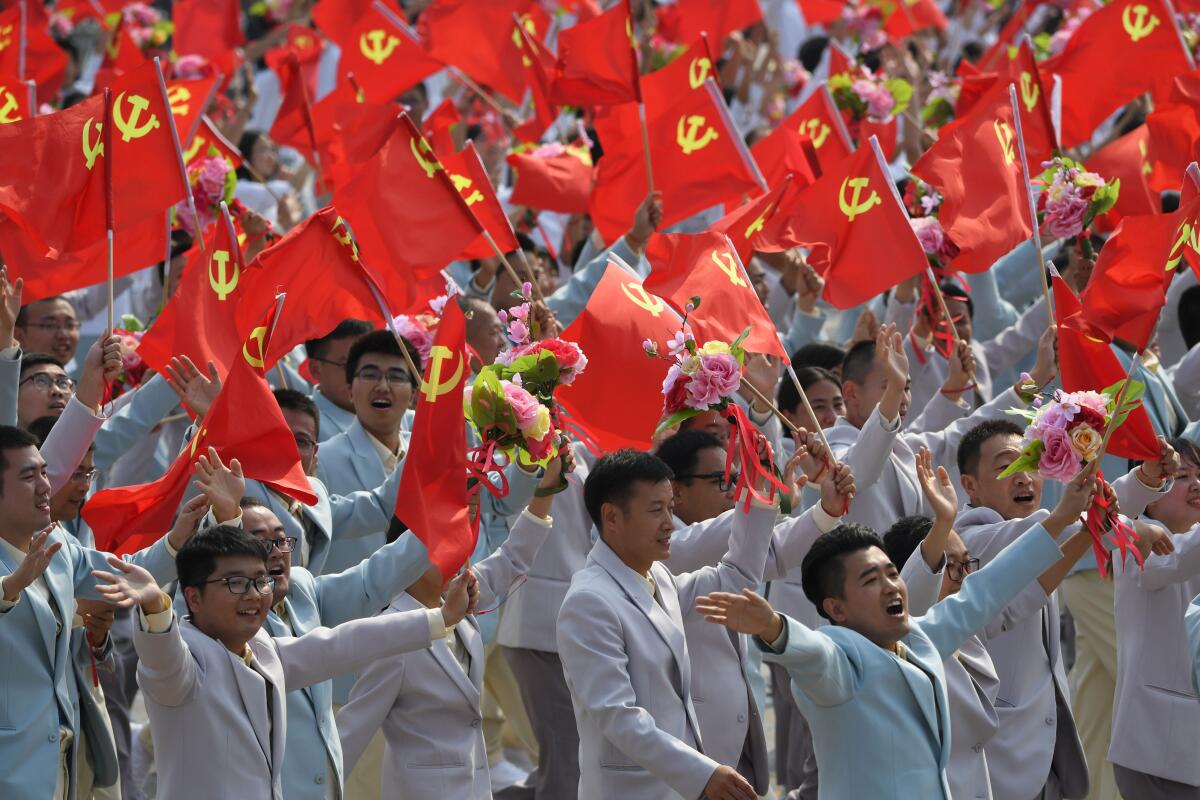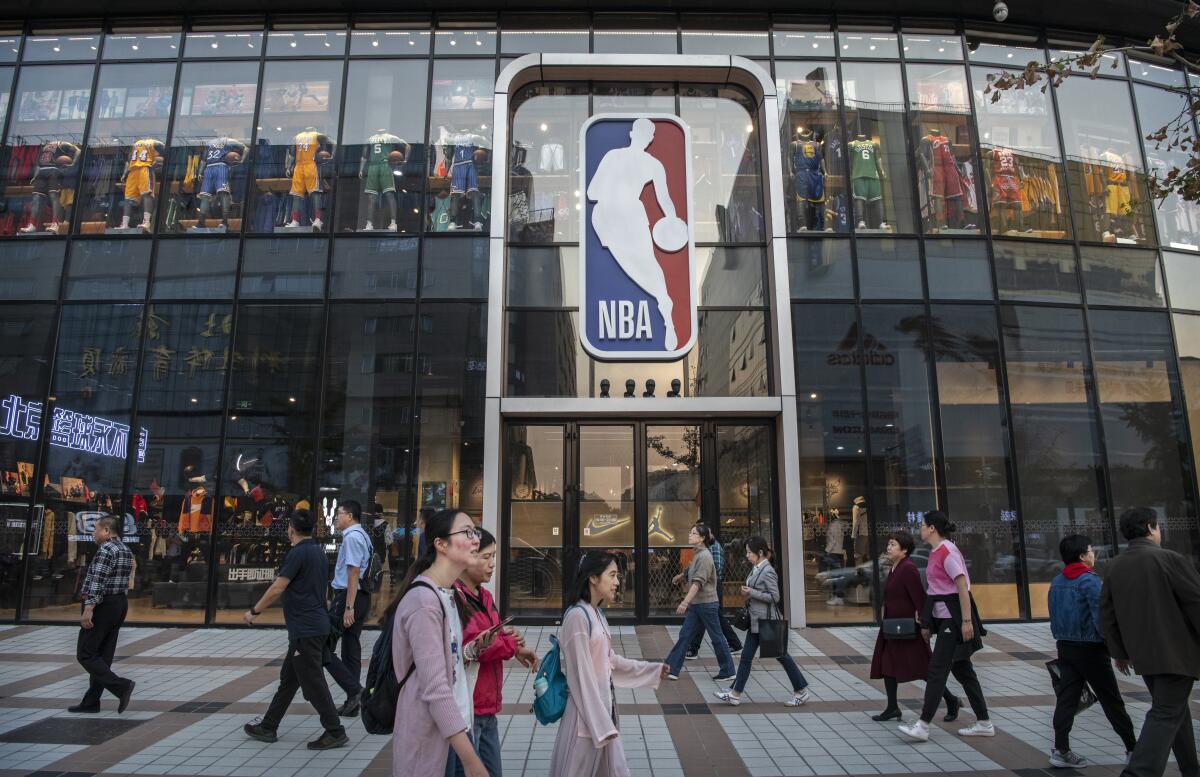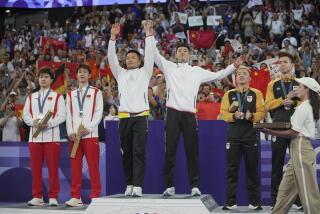Beijing whips up NBA anger, then winds it down, disappointing Chinese nationalists

BEIJING — Thousands of Chinese social media users had been afire with nationalistic anger all week, berating the NBA for its soft-pedaled stance on a manager’s tweet supporting protests in Hong Kong.
Chinese companies and state media piled on quickly in a united front of patriotic indignation, announcing a boycott and slashed partnerships with the NBA.
It felt like the whole country was united, standing up to the foreigners who dared insult China’s national sovereignty.
Then a Chinese nationalist took his anger to the streets. He made a red banner that read “Hong Kong belongs to China forever,” planning to unfurl it at the Lakers game in Shenzhen on Friday.
But before he even made it to the stadium, local police confiscated the banner, treated him roughly and brought him to a police station, according to his own account on Weibo, a state-censored social media platform similar to Twitter.
“What have I done wrong? Is this still China?” the user lamented in a post that has since been deleted. “Are you telling me Chinese people will be oppressed even for loving our country?”
Other videos posted on social media show police confiscating Chinese flags from people outside the Shenzhen stadium, preventing them from protest during the NBA game.
When The Times called Shenzhen police to confirm the incident, they said, “We’re not familiar with this affair” and hung up.
Beijing’s softening in its stance toward the NBA was so quick that even Chinese nationalists struggled to keep up, revealing a more complex relationship between Chinese authorities and “1.4 billion Chinese people’s feelings” than at first glance. Nationalism runs strong and genuine in the Chinese mainstream, but it doesn’t always cleave to a state-defined path.
When Houston Rockets manager Daryl Morey tweeted in support of Hong Kong protests last week, China was already in a fever of patriotic fervor. For months, state censors had replaced regular TV dramas with shows about China’s former humiliation by imperial powers, courageous Communist Party-led revolution, and return to glory under party Chairman Xi Jinping.
Every neighborhood was festooned with Chinese flags in the lead-up to Oct. 1, the 70th anniversary of the People’s Republic of China, marked with an extravagant military parade.
In one of Beijing’s old hutongs, or alleyways, a college student, Yu Jia, 22, explained patriotism as a sense of pride in social and economic progress.
“My great-grandmother always tells me what a great era we young women are experiencing: We can get education, marry whomever we choose, find a job we like,” Yu said. “When she was young, everything taken for granted now was a luxury.... Things have gotten so much better.”
Others said they were driven to defend national sovereignty, a principle as central and inviolable in Chinese society as the idea of freedom in the United States. Its importance has only become stronger under Xi, whose signature “China Dream” is one of a rejuvenated China that commands authority in the world.
Hong Kong’s protests are about autonomy and government accountability, not independence, but Chinese state media and officials have framed the protests as a separatist movement orchestrated by foreign powers who want to fragment China to make it weak.
Such framing triggers Chinese sensitivities to the “bottom line” of national sovereignty and fear of foreigners trying to secretly carve China into pieces, an idea taught throughout the education system and reinforced by state media.

At Beijing’s NBA flagship store, tourist Wang Anshu, 27, said he was a Kobe Bryant fan who’d watched NBA matches for nine years — but now planned to boycott the league.
“They can’t earn our money and not respect our national sovereignty,” Wang said. “Only when we have a strong nation, then our voice will be heard and respected.”
Another basketball fan, Li Shuang, 22, said he was boycotting the NBA too because he believed “Stand With Hong Kong,” the slogan Morey tweeted, was a statement of Hong Kong independence.
“The Chinese government under Xi Jinping would rather be feared than loved. They would rather silence international criticism on this topic than try to win over hearts and minds,” said Jessica Chen Weiss, a political scientist and associate professor of government at Cornell University.
But when a backlash arose in the United States, with lawmakers, gamers, basketball fans and South Park viewers all suddenly speaking up against China’s ability to censor free speech even across the ocean, Beijing seemed to recalibrate its NBA stance.
There was no official announcement, but Chinese media reportedly received internal instructions to tone down their criticisms of the NBA, according to the New York Times and China Digital Times, a website that compiles leaked Chinese government documents.
Hu Xijin, editor of the usually virulently nationalistic outlet Global Times, posted a surprising call for restraint on Weibo. “There’s no need for cutting cooperation with the NBA to become some sort of trend,” Hu wrote. “As America becomes more closed, China needs to keep a more open mind-set.”
By Monday, Chinese media giant Tencent had resumed live-streaming NBA games. Nationalists voiced their disappointment online.
“We have already surrendered?” wrote one Weibo user with the screen name Hsiung Fan.
“I feel like an idiot to believe everything was real,” wrote another user named Yuchen Bao_Bao.
One explanation for the apparent change is that some branches of government — such as the Ministries of Commerce and Foreign Affairs, which were trying to strike a trade deal with the U.S. last week — may have complained that overheated attacks on the NBA were hampering their work.
“This kind of highly nationalistic emotions are promoted by certain Communist Party and government branches rather than the government as a whole,” said Fang Kecheng, professor of communication and journalism at the Chinese University of Hong Kong. He pointed to state media, which serve as the propaganda department, as an example.
“By publishing those articles criticizing Apple, the NBA, they can draw a lot of page views and shares and likes and followers,” he said. “They can report to their boss saying, we have been doing great and we have significant influence online, especially among young people.”
Whether that influence is real is hard to gauge. Cyber nationalism tends to be exaggerated on the Chinese internet, Fang said, partly because it matches state-supported narratives and also because that’s how social media work everywhere: They amplify radical content and do not accurately represent public opinion.
“The nature of social media is that content charged with emotions are more likely to be shared,” Fang said. “In the specific context of China, the emotion that is allowed by government authorities is basically nationalistic.”
The danger of state-fostered nationalism is that it can spark grassroots organization and spill into the streets. That’s happened in cases including anti-American protests after U.S. bombing of the Chinese Embassy in Belgrade in 1999 and anti-Japanese protests in 2005 in response to new Japanese history textbooks whitewashing war crimes.
Those protests were permitted, but in other cases, China represses nationalist protests, especially over Taiwan — in part because the most hawkish protesters demand action beyond what the Chinese government can deliver, like immediate war.
When it comes to that, Chinese authorities rein nationalism in.
“What they fear the most is that protesters will go on the street and form a movement,” Fang said. “Nationalism has always been a double-edged sword.”
It’s a classic Chinese government tactic, Weiss said: to whip up nationalism for domestic purposes, then reel it back when it begins to do more harm than good from the authorities’ perspective.
But the tactic comes at a cost.
“Every time they spin up and wind down nationalism, it generates resentment at the government’s hypocrisy and willingness to crack down on patriotism,” Weiss said.
Ironically, many nationalists defend the country against human rights activists, dissidents and protesters who criticize China’s authoritarian system of governance — until they are shut up by the system themselves.
By Saturday night, the Weibo user who tried to protest had deleted his posts and replaced them with a new message thanking the Shenzhen police for helping him change his views.
“I truly feel that there is a possibility of disrupting public order by holding up banners in a public place. I hope all comrades and friends will be rational patriots. Let’s build a civilized, wealthy and strong China together,” he wrote, ending his post with the emoji of a Chinese flag.
Nicole Liu and Gaochao Zhang of The Times’ Beijing bureau contributed to this report.
More to Read
Sign up for Essential California
The most important California stories and recommendations in your inbox every morning.
You may occasionally receive promotional content from the Los Angeles Times.











